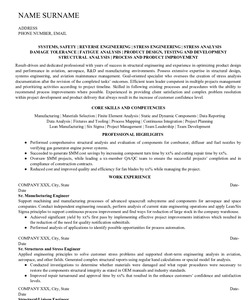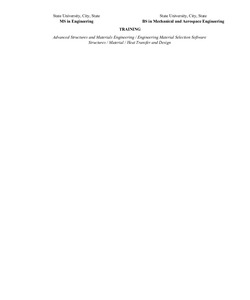Resume Example for Structural Engineer
Structural engineers are the people who can build fantasies. The essential competencies (managing production, planning, and staff management) that are included in nearly every structural engineer's CV should be highlighted; however, it's also necessary to include extra information to make your application more than noticeable. Some technical skills can be explained further. Below, we will review the samples and share valuable recommendations on how to create a winning resume format for engineers.
Structural Engineer Resume Samples
When it comes to structural engineer resumes, a compelling sample can be a game-changer. Below are a couple of examples that showcase the dos and don'ts of crafting a resume.
Example of a Good CV
Download the sample we have. This resume of a seasoned structural engineer with a knack for innovative designs got accepted by recruiters and ended up in their yes pile of candidates. The resume is a testament to person's achievements, neatly organized with a concise summary, highlighting her experience and skills. It's tailored to the job they were applying for, showcasing their passion for structural engineering. Want to have this type of resume? Check job details to understand which qualities are needed and focus on them in your resume. Check your responsibilities section. Does it sound similar to the job description? If yes, you're on the right track. If not, check our structural engineer sample for more details.
Example of a Bad CV
Contrastingly, there can be a bad resume. It's cluttered and generalized, lacks focus, and fails to communicate the strengths of the candidate. The absence of specific achievements and a generic approach to showcasing skills makes it less appealing. Does your resume give a feeling it was downloaded from the Internet without any customization and specific keywords? A potential employer might struggle to see what sets a person apart in such a resume.
Responsibilities of a Structural Engineer
What are the responsibilities of a structural engineer? Their main tasks include the qualitative design of a variety of equipment and various technological tools. Every day, this specialist is engaged in the development of technological schemes, calculations, and drawings of nodal elements and parts of mechanisms, prepares technical tasks for production, and carries out personal supervision of manufacturing and testing. In small companies, their responsibilities include coordinating projects with different organizations that control and even search for customers.
The work of an engineer does not end at the stage of designing and calculations. "Weaknesses" of the design appear on the tests. With the help of special diagnostic equipment, it is possible to test the flight characteristics of the aircraft, the suitability of the jeep, and the tightness of the submarine. They communicate with technicians and find out how easy the technique is to use and, if necessary, refine the design.
What personal qualities should this specialist have? First of all, there are:
- High concentration and stability of attention;
- Logical thinking;
- The technical makeup of the mind;
- Analytical thinking.
It begins with studying at a specialized university. The profession requires fundamental technical knowledge. Employment problems usually do not arise. This profession for young professionals guarantees interesting work on a variety of projects.
Tips for Writing a Structural Engineer Resume
Creating an engineers resume requires finesse. Here are some practical tips to enhance your structural engineer resume:
- Tailor your CV to each application. Emphasize the specifics of your background and experience that meet the job requirements.
- Impress with numbers, not only words. Quantify your accomplishments if you increased productivity or decreased expenses. It strengthens the content of your engineering CV.
- Remain clear and concise. Don't use jargon or speak plainly. Your resume needs to be easy to read and comprehend.
- Add more focus on your knowledge of programming languages, software tools, and other technical abilities related to structural engineering.
Skills and Work Experience
A structural engineer's skills and work experience are the pillars of their engineering sample resume. Credible evidence of your skills is what prospective employers want to see.
- A key requirement is proficiency in assessing and developing structures with the newest instruments and technology. Indicate which particular projects benefited most from your analytic abilities.
- Present your skills as a project manager, from inception to conclusion. Highlight your responsibility for liaising with different departments and guaranteeing prompt delivery.
- Engineering requires effective communication. Incorporate examples of your ability to communicate intricate technical details to a range of audiences.
- Problem solving is what structural engineers do. Give instances of difficulties you have encountered and how your creative solutions have aided in the accomplishment of the assignment.
Examples of Key Skills
Be sure to describe your structural engineering skills in a resume, such as determining the value of work, contract work, maintenance and coordination of project documentation, measurement, calculation and writing of reports, monitoring, and negotiation. Here are some key skills that should find a prominent place in your resume:
- Structural Analysis Software: Proficiency in software like SAP2000, ETABS, and RISA is essential. Demonstrate your ability to use these tools effectively.
- CAD Proficiency: Adeptness in computer-aided design (CAD) tools such as AutoCAD is a must. Showcase your ability to create precise and detailed drawings.
- Project Management: Highlight your project management skills, including budgeting, scheduling, and resource allocation.
- Collaboration: Focus on your ability to work efficiently with architects, contractors, and other stakeholders. Effective collaboration is a key aspect of successful project execution.
Other skills of a structural engineer include the following points:
- Organization and production planning
- The effective functioning of production equipment
- Knowledge of technological lines
- Management of productive resources
- Knowledge of production and supply cycle
- Statistical methods
- Knowledge of health and safety rules
- Knowledge of production monitoring systems
This is a fascinating and dynamic career, but it's also highly technical. In order to effectively handle all of your duties, you must possess a wide range of theoretical and practical knowledge and—above all—the ability to blend them together in a working environment.
It's also important to remember that an engineer who wants to succeed in his job must be highly talented and continuously improve their work ethic. A successful engineer cannot afford to make mistakes in their work, especially if the goal is a successful career.
Because it calls for a certain combination of abilities, experiences, and accomplishments that are accurately portrayed, creating a structural example resume may be quite a challenge. You may benefit from using some structural engineer resume samples and getting closer to those interesting chances in the field of structural engineering with confidence.
Subscribe to our newsletter
Get $15 discount on your first order!

